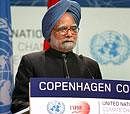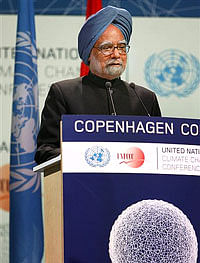

The 12-day climate talks spilled overnight with consensus eluding on a substantive agreement and world leaders delayed their departures to meet again to find common ground amid serious attempts by rich nations to break the ranks of the developing countries.
The leaders of the group of four -- India, China, South Africa, and Brazil (BASIC) -- met again as the deadlock continued.
"The concerns of the developing countries was the verification of their nationally accountable mitigation actions," an official privy to the talks said.
The developing countries felt that any international review of their voluntary mitigation actions would mean an intrusion on their sovereignty.
Several drafts went back and forth as Obama waited for the BASIC leaders to conclude their discussions. The rich nations were also pressing for a 50 per cent emission cut across the board, which the developing nations were not ready to accept.
The talks among BASIC now revolved around agreeing on a formulation for reporting of mitigation actions with some expressing readiness to increase the frequency of national communication to the United Nations on steps they had taken to tackle global warming.
At this stage Obama came knocking at the doors of the room where BASIC leaders were having a meeting. 'Can I join you now,' he asked them. Chinese Premier Wen Jiabao said he was welcome to join them.
The BASIC leaders conveyed to him their concerns on environment issues being used as trade barriers as also their unwillingness to agree to 50 per cent emission cuts.
Prime Minister Manmohan Singh told Obama that he cannot accept any international review of India's mitigation actions. He underscored that India was a Parliamentary democracy and his government was answerable to Parliament.
At this stage Obama is understood to have mooted a legally non-binding treaty but the Europeans, who were keen on a legally-binding pact needed to be on board.
Another suggestion doing the rounds was to have international consultations on the lines of the WTO for sharing information on mitigation actions.
Leaders believed that international consultations was an accepted phrase in the multilateral fora.
The negotiators were still going through the minute details of the draft and PM's Special Envoy Shyam Saran stayed back in the Danish capital.